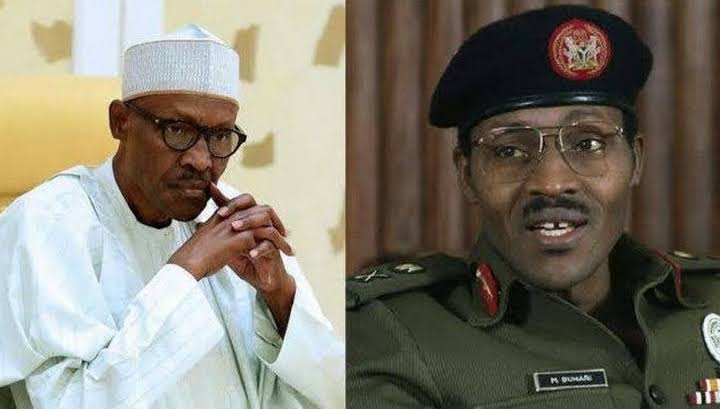638
By Tracy Moses
Though often surrounded by controversy, Muhammadu Buhari is widely believed to have been born on December 17, 1942, in Daura, Katsina State.
He hailed from a Fulani family and was the 23rd child of his father. Buhari lost his father at a young age and was raised solely by his mother.
He began his formal education at Katsina Provincial Secondary School (now Government College, Katsina), and in 1962, he joined the Nigerian Military Training College. His military aspirations took him beyond Nigeria’s borders, as he proceeded to the Mons Officer Cadet School in the United Kingdom and later to the prestigious United States Army War College for further training.
Buhari steadily climbed the military ranks in the post-independence era. He served in various strategic roles, including as the Military Governor of the now-defunct North-Eastern State in 1975, and as Federal Commissioner (Minister) for Petroleum and Natural Resources under the regime of General Olusegun Obasanjo.
Military Rule: Head of State (1983–1985)
On December 31, 1983, Major General Muhammadu Buhari seized power in a bloodless coup, overthrowing the civilian government of President Shehu Shagari. He justified the takeover on grounds of widespread corruption, economic mismanagement, and the need to restore national discipline.
One of the most notable initiatives of his regime was the War Against Indiscipline (WAI), a campaign aimed at promoting ethical conduct, curbing corruption, and instilling public order. The policy gained national acclaim and became a defining element of Buhari’s public image throughout his lifetime.
Under WAI, acts such as public urination and disorderly queues at banks or motor parks were criminalized and met with military-style discipline.
Despite these efforts, the administration was heavily criticized for authoritarian practices, including human rights violations, detention of politicians without trial, media censorship, and the controversial Decree No. 4, which criminalized press reports considered embarrassing to the government.
Buhari’s tough anti-corruption stance and rigid economic policies, particularly strict import controls, led to severe shortages and economic hardship for many Nigerians.
His time as Head of State was short-lived. In August 1985, his government was overthrown in another coup led by General Ibrahim Babangida.
From Soldier to Statesman: Buhari’s Return as a Civilian Politician
After his removal from power, Buhari remained largely out of public view until the late 1990s, when he resurfaced as a vocal advocate for accountability and national discipline.
His alignment with General Sani Abacha’s military regime earned him the role of Chairman of the Petroleum Trust Fund (PTF), where he managed infrastructural projects funded by oil surplus revenues.
In 2003, Buhari transitioned into full-fledged politics, contesting for the presidency under the All Nigeria Peoples Party (ANPP) but lost to incumbent President Olusegun Obasanjo. Undeterred, he contested again in 2007 and 2011, both unsuccessfully, amid allegations of electoral irregularities.
In 2013, he played a key role in forming the All Progressives Congress (APC), a merger of opposition parties created to unseat the ruling Peoples Democratic Party (PDP).
Civilian Presidency: 2015–2023
Buhari made history in 2015 by defeating incumbent President Goodluck Jonathan, becoming the first Nigerian to unseat a sitting president through democratic elections. He was re-elected in 2019, serving two full terms before handing over to his long-time ally, President Bola Ahmed Tinubu, in 2023.
He rose to power on a platform promising to fight corruption, end the Boko Haram insurgency, and revive Nigeria’s struggling economy. However, critics argue that his administration fell short on many of these promises.
While initial gains were made in the fight against Boko Haram, his presidency was soon overwhelmed by worsening insecurity, marked by banditry in the northwest, violent farmer-herder clashes in the middle belt, and secessionist agitations in the southeast.
Economically, Buhari’s government weathered two major recessions in 2016 and 2020, largely due to plummeting oil prices and the COVID-19 pandemic. While he was commended for driving agricultural self-sufficiency and initiating key infrastructural projects in roads, railways, and power, his broader economic policies were criticized for failing to reduce unemployment, curb inflation, or drive sustainable growth.
By 2018, Nigeria had gained the unenviable title of the “poverty capital of the world,” with an estimated 90 million people living below the poverty line.
Legacy
Muhammadu Buhari’s life journey, from a rural upbringing in Daura, to military leadership, political setbacks, and eventual emergence as a two-term democratic president, marked a complex and often polarizing chapter in Nigeria’s history.
He will be remembered as a leader with a strict, disciplinarian persona, whose policies sparked both admiration and criticism across the political divide.



